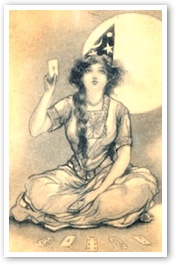Psychics and Witches
- FR. WILLIAM SAUNDERS
Recently, I have been seeing more ads on television about psychic counselors. Also, there is a TV show about Sabrina, the teenage witch. How should we as Christians be relating to these issues?
 |
As Catholics we remember that the first commandment states, "I am the Lord thy God. Thou shalt not have any gods before me." When asked what was the greatest commandment, our Lord Jesus Christ, repeating the precept found in Deuteronomy, said, "You shall love the Lord your God with your whole heart, with your whole soul, and with all of your strength" (Matthew 22:37). While God can choose to reveal the future to His prophets or saints, we as individuals must always have trust in His divine providence. St. Paul reminds us "We know that God makes all things work together for the good of those who love Him who have been called according to His decree" ((Romans 8:28). While we may have that passing curiosity of what will happen in the future, we anchor our lives in the Lord, trusting in His love and care.
To try to discover the future through palm reading, tarot cards, or some other form of fortune-telling, or to try to control the future through black magic, witchcraft, or sorcery violates the first commandment. Sacred Scripture has many condemnations of these activities: In the Old Testament we find "You shall not let a sorceress live" (Exodus 22:17), "Whoever sacrifices to any god, except to the Lord alone shall be doomed" (Exodus 22:19). "A man or a woman who acts as a medium or fortuneteller shall be put to death by stoning: they have no one but themselves to blame for their death" (Leviticus 20:27), and `'Let there not be found among you anyone who immolates his son or daughter in the fire, nor a fortuneteller, soothsayer, charmer, diviner or caster of spells, nor one who consults ghosts and spirits or seeks oracles from the dead. Anyone who does such things is an abomination to the Lord..." (Deuteronomy 18:1012).
The New Testament also addresses this issue: St. Paul condemned sorcery (Galatians 5:19). In Acts of the Apostles, St. Paul rebuked Elymas, the magician, calling him "son of Satan and enemy of all that is right" (Acts 13:8ff), and St. Peter rebuked Simon Magus, a magician, who wanted to buy the powers of the Holy Spirit to make himself more powerful (Acts 8:9ff). In the Book of Revelation, Jesus declared, "As for the cowards and traitors to the faith, the depraved and murderers, the fornicators and sorcerers, the idol-worshipers and deceivers of every sort — their lot is the fiery pool of burning sulfur — the second death" (Revelation 21: 8).
Particular concern must be given to witchcraft, which involves both unraveling the future as well as trying to control the future. Granted, the television show Sabrina or the older one Bewitched may have lightheartedly built a story around witches and witchcraft. Nevertheless, witchcraft involves producing certain effects which are beyond one's natural powers through the assistance of powers (the occult) other than those of God. Commonly, witchcraft involves a pact with the devil or at least some imploring of evil spirits for assistance. The annals of witchcraft include rites to awaken the dead, arouse passion in a person, and bring disaster or even death upon an enemy. Satanism, in particular, gives homage to the Prince of Darkness, and even celebrates a "Black Mass," which parodies our Mass but commits sacrilegious and blasphemous actions. Even if one talks of "white magic" or "white witchcraft," the practitioner is invoking powers not of God in ways outside those of prescribed religion.
 This is Meaghen Gonzalez, Editor of CERC. I hope you appreciated this piece. We curate these articles especially for believers like you.
This is Meaghen Gonzalez, Editor of CERC. I hope you appreciated this piece. We curate these articles especially for believers like you.
Please show your appreciation by making a $3 donation. CERC is entirely reader supported.

Acknowledgement
Saunders, Rev. William. "Psychics and Witches." Arlington Catholic Herald.
This article is reprinted with permission from Arlington Catholic Herald.
The Author

 Father William Saunders is pastor of Our Lady of Hope parish in Potomac Falls, Virginia. He is dean of the Notre Dame Graduate School of Christendom College. The above article is a "Straight Answers" column he wrote for the Arlington Catholic Herald. Father Saunders is the author of Straight Answers, a book based on 100 of his columns, and Straight Answers II.
Father William Saunders is pastor of Our Lady of Hope parish in Potomac Falls, Virginia. He is dean of the Notre Dame Graduate School of Christendom College. The above article is a "Straight Answers" column he wrote for the Arlington Catholic Herald. Father Saunders is the author of Straight Answers, a book based on 100 of his columns, and Straight Answers II.


